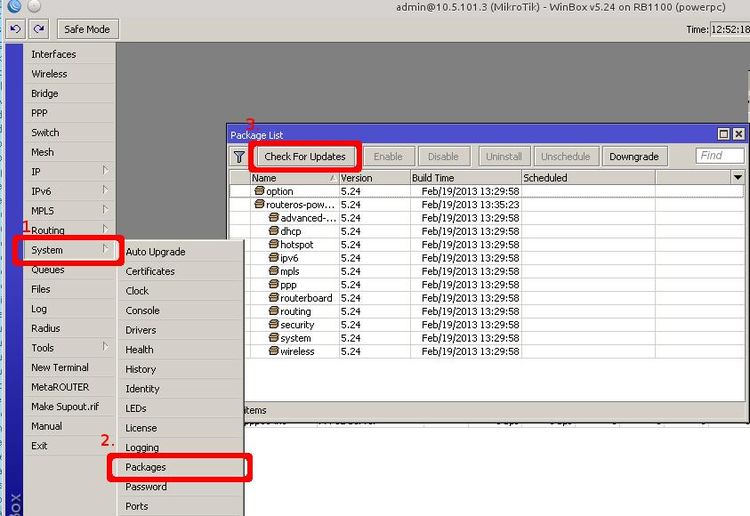According to its self-reported version, the remote networking device is running a version of MikroTik prior to 6. MikroTik RouterOS refmap via4. This vulnerability could theoretically allow a remote authenticated attacker execute arbitrary code on the system. This attack pattern is a variant of standard buffer overflow attacks using an unexpected vector binary files to wrap its attack and open up a new attack vector. Buffer Overflow in an API Call This attack targets libraries or shared code modules which are vulnerable to buffer overflow attacks. 
| Uploader: | Dalkree |
| Date Added: | 19 May 2009 |
| File Size: | 25.91 Mb |
| Operating Systems: | Windows NT/2000/XP/2003/2003/7/8/10 MacOS 10/X |
| Downloads: | 98306 |
| Price: | Free* [*Free Regsitration Required] |
MikroTik RouterOS refmap via4. These attacks may pass unnoticed to the client machine through normal usage of files, such as a browser loading a seemingly innocent JPEG file.
Index of /download/archive/5.14
Many systems, for instance, implement a password throttling mechanism that locks an account after a certain number of incorrect log in attempts. As a consequence, an attacker is able to write past the boundaries of allocated buffer regions in memory, causing a program crash or potentially redirection of execution as per the attackers' choice. This attack relies on the target software failing to anticipate that the expanded data may exceed some internal limit, thereby creating a buffer overflow.
An attacker can leverage this throttling mechanism to lock a legitimate user out of their own account. Mikrotik RouterOS before 6.

An attacker can try to create or manipulate a symbolic link file such that its contents result in out routerros bounds data. Net, databases, and so on. According to its self-reported version, the remote networking device is running a version of MikroTik prior to 6.
Buffer Overflow in an API Call This attack targets libraries or shared code modules which are vulnerable to buffer overflow attacks. This attack targets libraries or shared code modules which are vulnerable to buffer overflow attacks. When the target software processes the symbolic link file, it could potentially overflow internal buffers with insufficient bounds checking.
Buffer Overflow via Environment Variables This attack pattern involves causing a buffer overflow through manipulation of environment variables. This has a very broad effect on security across a rouyeros, usually routetos more than one software process.
Buffer Overflow attacks target improper or missing bounds checking on buffer operations, typically triggered by input injected by an attacker. This type of attack exploits a buffer overflow vulnerability in targeted client software through injection of malicious content from a custom-built hostile service. XML Ping of the Death An attacker initiates a resource depletion attack where a large number of small XML messages are delivered at a sufficiently rapid rate to cause a denial of service or crash of the target.
All of the above attacks exploit the loosely coupled nature of web services, where the service provider has little to no control over the service requester and any messages the service requester sends.
Mikrotik RouterOS before 6. The attacker crafts a malicious HTML page or configuration file that includes oversized strings, thus causing an overflow. The transactions used are immaterial as long as they cause resource utilization on the target.
Index of /download/archive/
The weakness that is being leveraged by an attacker is the very security feature that has been put in place to counteract attacks. This attack leverages implicit trust often placed in environment variables. A small number of nested expansions can result in an exponential rrouteros in demands on memory. The attacker then is notified upon the download or otherwise locates the vulnerability opened up by the buffer overflow.
MikroTik RouterOS refmap via4. This type of attack leverages the use of tags or variables from a formatted configuration data to cause buffer overflow.
rouheros An attacker who has access to an API may try to embed malicious code in the API function call and exploit a buffer overflow vulnerability in the function's implementation. The main weakness in XDoS is that the service provider generally must inspect, parse, and validate the XML messages to determine routing, workflow, security considerations, and so on.
It is exactly these inspection, parsing, and validation routines that XDoS targets. Overflow Binary Resource File An attack of this type exploits a buffer roteros vulnerability in the handling of binary resources. This attack pattern is a variant of standard buffer overflow attacks using an unexpected vector binary files to wrap its attack and open up a new attack vector.
In other words, this is a normal flooding attack augmented by using messages that will require extra routedos on the target.
Buffer Overflow in Local Command-Line Utilities This attack targets command-line utilities available in a number of shells. All clients that make use of the code library thus become vulnerable by association.

No comments:
Post a Comment